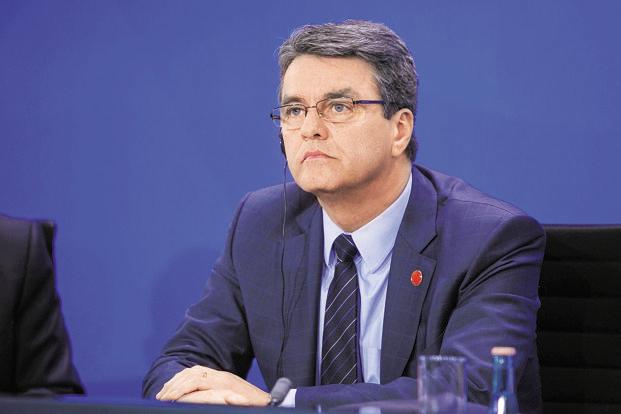
India along with China, South Africa, Indonesia, Ecuador, and Venezuela have upped the ante in their protracted trade battle with the US, the European Union, and Japan at the World Trade Organization to ensure that the Doha Development Agenda (DDA) negotiations are not spiked at the Nairobi ministerial later this month, according to people familiar with the development.
At a closed-door meeting of select countries on Tuesday, trade envoys of India, China, and South Africa told WTO director general Roberto Azevedo that they will not accept the language proposed by the three facilitators as a basis for negotiating the draft ministerial declaration to be adopted at the WTO’s 10th ministerial meeting in Nairobi beginning on 15 December.
The three countries presented detailed textual language to be inserted in the preamble and post-Nairobi work programme to reaffirm the continuation of DDA negotiations immediately after the Nairobi meeting.
The WTO director general convened the closed-door meetings involving over two dozen trade envoys to know the thinking of the key members on issues scheduled for the full meeting of the membership.
The so-called green room participants invariably include the US, the EU, Japan, Canada, Australia, Switzerland, New Zealand, Norway, China, India, Indonesia, Korea, Malaysia, Singapore, Thailand, Brazil, Argentina, Mexico, Colombia, Peru, Chile, South Africa, Kenya, Nigeria, Egypt, Lesotho, Barbados, and Jamaica, among others.
At the meeting, India, China, and South Africa suggested the language to be inserted in the consolidated draft. Later, India, China, South Africa, Indonesia, Ecuador, and Venezuela submitted their textual proposal to the secretariat in which the preamble reads: “We reaffirm the Doha Development Agenda (DDA), and the Declarations and Decisions adopted at Doha and at the Ministerial Conferences held since then, and further reaffirm our full commitment to conclude the DDA negotiations on that basis.’’
On the crucial post-Nairobi work programme, the six countries reiterated their proposal.
Further, the six proponents also suggested caveats to ensure that there is proper treatment of their textual language in the draft consolidated text. They maintained that if their proposal is placed in brackets, then the language suggested by the three facilitators must also be put in brackets.
Azevedo agreed to include the proposal submitted by the six countries in the consolidated draft text, according to participants familiar with the meeting.
The proposal from the six countries came as a body blow to the US, the EU, and Japan who repeatedly called for closing the DDA negotiations in Nairobi.
The three advanced countries almost succeeded in their goal when a panel of three facilitators bolstered their case by proposing weak and ambiguous language in the consolidated draft ministerial declaration that they had issued last Friday.
The facilitators- Ambassador Gabriel Duque of Colombia, Ambassador Stephen Karau of Kenya, and Ambassador Herald Neple- mentioned the Doha negotiations in poor light despite some major agreements that were concluded since 2001 when the negotiations were launched in Doha, Qatar.
As part of the DDA negotiations, for example, members concluded a $1trillion agreement on trade facilitation. Besides, members also agreed on broad benchmarks for completing agreements in agriculture to reduce farm subsidies and non-tariff barriers.
But the three facilitators played down these achievements by suggesting that “at our Fourth Session, we launched for the first time in the history of the GATT (General Agreement on Tariffs and Trade) and the WTO, a Development Round -the Doha Development Agenda. We have made some progress in the negotiations.”
Further on the post-Nairobi work programme in which the US, the EU, and Japan do not want the DDA negotiations to be mentioned, the three facilitators merely suggested that despite “advances” in the Doha negotiations, “it has not been possible to reach agreement on all areas of the negotiations, including Agriculture, NAMA, Services, Rules, including fisheries subsidies, and TRIPS.”
NAMA is short for non-agricultural market access and TRIPs stands for trade-related aspects of intellectual property rights .
The stand-off over new approaches and new issues has also intensified between India, China, and South Africa on the one side, and the US, the EU, Japan, and other developed countries on the other.
During a closed-door meeting of select countries on Monday, India, China, and South Africa rejected the trade-off between the continuation of DDA negotiations on the one side, and adopting new approaches to conclude the negotiations on the other, according to a South American trade envoy who was present at the meeting. “The Nairobi meetings hangs on balance as there is no common ground on any issue at this juncture,” the envoy said on condition of anonymity.